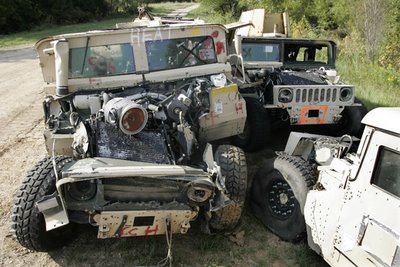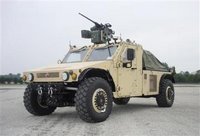It's getting harder and harder to paint all Iraq war opponents as far-left crazies.
Frankly, it was impossible from the beginning; many, many reasonable people have opposed the mess from the start, even while hoping things would somehow turn out okay. But the drumbeat of rhetoric labeling such questioners as enemy sympathizers, or demanding that we rally behind the president in this time of crisis, helped delay serious discussion of the war for years.
Now, another Republican is breaking ranks.
At the close of the Senate’s lame-duck session, in between formulaic tributes to senators departing voluntarily or otherwise, a Republican backbencher suddenly rose to give one of the most passionate and surprising speeches about the war in Iraq yet delivered in Congress.
For a solid Republican who had originally voted for the war, the words spoken by the senator, Gordon H. Smith of Oregon, on the evening of Dec. 7 were incendiary and marked a stunning break with the president.
“I, for one, am at the end of my rope when it comes to supporting a policy that has our soldiers patrolling the same streets in the same way, being blown up by the same bombs day after day,” Mr. Smith said. “That is absurd. It may even be criminal.”
Smith cited two books as influential in changing his thinking: Thomas Ricks' "Fiasco" and a World War I book by John Keegan. In explaining the latter, Smith said:
Mr. Smith said that his use of the word “criminal” in his speech to describe the war in Iraq came from his reading of that book, which he said explained to him the “practice of British generals, sending a whole generation of British men running into machine guns, despite memos back to London saying, in effect, machine guns work.”
Much like the British in World War I, he added, “I have concluded that we are employing strategies that are needlessly getting kids killed.”
It's come to this: a Republican senator is now comparing Iraq to the senseless and indiscrimate slaughter of World War I. Not in scale, of course, but in the stubborn and heedless mindset that let politicians continue to send young men to their pointless deaths.
He might also have consulted "Imperial Life in the Emerald City" by Rajiv Chandrasekaran, which describes the detached reality inhabited by Paul Bremer and his postwar transitional government and the incredible decisions made by the Bush administration on its behalf. Chandrasekaran was a guest on MPR this morning, and he gave multiple examples of Bush's fantasyland at work. Bremer's staff, for instance, was chosen for political loyalty rather than any actual qualifications, with screeners that questioned applicants on their voting record and stance on abortion.
So you had the spectacle of a 24-year-old with no practical experience trying to restart the Baghdad stock exchange; A 21-year-old, not yet out of college, given sole responsibility for reforming the Interior Ministry; and an experienced post-conflict public-health official replaced by a more politically acceptable community-health official from Michigan, whose first order of business upon arriving in Iraq was to start planning an anti-smoking campaign.
Given such startling incompetence from our politicians, it's hardly surprising that we have arrived at the point we have. The question is what to do about it now.
Smith's point in that regard -- that we are pursuing a strategy that is not working and, in the process, is getting people killed needlessly -- is echoed by many soldiers currently serving in Iraq, who were asked if a troop "surge" of up to 30,000 soldiers would help pacify Baghdad.
Spc. Don Roberts, who was stationed in Baghdad in 2004, said the situation had gotten worse because of increasing violence between Shiites and Sunnis. "I don't know what could help at this point," said Roberts, 22, of Paonia, Colo. "What would more guys do? We can't pick sides. It's almost like we have to watch them kill each other, then ask questions." ...
"Nothing's going to help. It's a religious war, and we're caught in the middle of it," said Sgt. Josh Keim, a native of Canton, Ohio, who is on his second tour in Iraq. "It's hard to be somewhere where there's no mission and we just drive around." ...
Pfc. Richard Grieco said it's hard to see how daily missions in Baghdad make a difference. "If there's a plan to sweep through Baghdad and clear it, (more troops) could make a difference," said the 19-year-old from Slidell, La. "But if we just dump troops in here like we've been doing, it's just going to make for more targets."
Translation: We're not making headway; we're just sort of keeping the lid on things, and losing ground as the violence escalates daily. Which is a recipe for still being there 10 years from now, doing the same thing, and watching more of our soldiers die -- not in pursuit of victory, but in denial of failure. And 30,000 troops just isn't enough to make a difference in that equation.
President Bush says he'll announce his brilliant new Iraq strategy in early January. At that point we'll be able to judge whether he actually intends to materially alter the strategic situation. If not, there is little point to our continued presence in Iraq.
terrorism, Iraq, politics, midtopia




